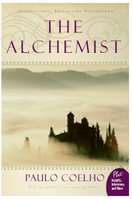 By all rights, Paulo Coelho's The Alchemist should have single-handedly delivered a knock-out blow to any popular conception that Latin American literature is "good" literature. The novel is, simply put, execrable tripe.
By all rights, Paulo Coelho's The Alchemist should have single-handedly delivered a knock-out blow to any popular conception that Latin American literature is "good" literature. The novel is, simply put, execrable tripe.At the very least (as I commented earlier), Coelho should have changed our idea of what it is to be a Latin American author: his work is global in almost every sense of the term, from its international success (his website, itself available in sixteen languages, tells us that he "has sold a total of 85 million copies" of his books, 30 million copies of The Alchemist alone, and that he's been translated into 62 languages and published in more than 150 countries) to its settings and themes, which usually have very little to do with Coelho's native Brazil.
But perhaps this is precisely why The Alchemist seems so distinct from any specifically Latin American literary tradition. Though Coelho claims Borges (another global writer, if of another calibre) to be one of his inspirations, The Alchemist has more in common with, say, Saint-Exupéry's The Little Prince or (even more so) Bach's Jonathan Livingston Seagull than with, say, "Pierre Menard, Author of the Quixote" let alone A Hundred Years of Solitude.
Moreover, I'd wager that the market for Coelho and the market for García Márquez, vast as they both are, are also almost entirely distinct: i.e. that those who read the former hardly ever read the latter, or vice versa.
Yet The Alchemist must do something for someone--perhaps even for 85 million someones. Though the moral peddled by this fable of a shepherd boy's voyage to find a treasure he dreams awaits him (be true to your dream, listen to your heart) and even the story's dénouement (the treasure turns out to have been right where the boy started out from all along) are both trite and surely familiar, perhaps they help the book's readers make it through somehow. Coelho's blog invites us to become Warriors of Light as we Walk the Path with him in pursuit of our own "Personal Legends." And as with countless other New Age movements (and this is surely New Age however much it's inflected through Coelho's own Catholicism), such a sense of pilgrimage, both communal and highly individualistic, no doubt compensates for some generalized sense of social anomie.
Indeed, it's striking how much the "Reader's Guide" appended to the HarperCollins edition of the book encourages us to view The Alchemist almost as a devotional text: "questions for discussion" include "can you define your Personal Legend?" and "Having read The Alchemist do you know what inner resources you need to continue the journey?" (173, 174).
In short, we're enjoined to read the fable as "truth" rather than "fiction," perhaps even as anti-literature. And it's tempting to agree that Coelho's work is (in a rather different sense) indeed anti-literary, supremely non-literary. But surely the first premise of any critical account would be to insist on its literary quality: to emphasize that this is indeed literature; bad literature, no doubt, but literature none the less.
No comments:
Post a Comment